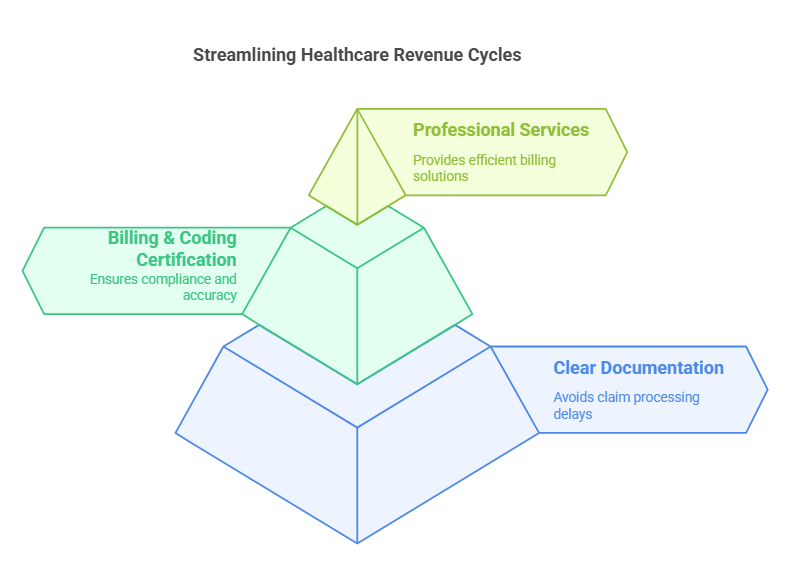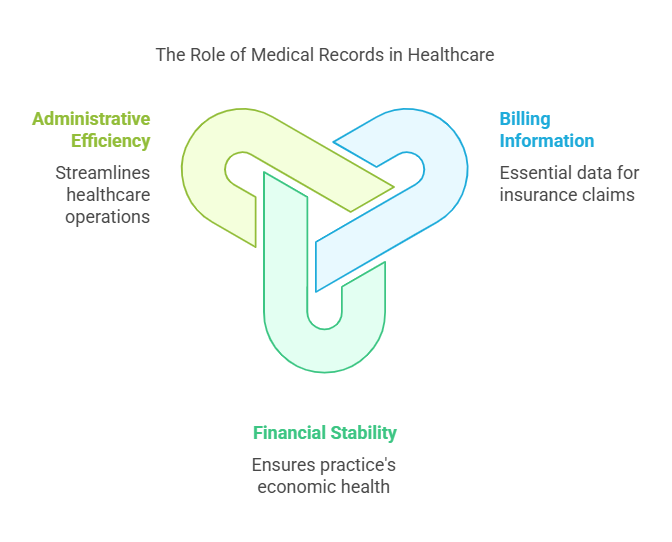Describe The Relationship Between Medical Records Documentation and Billing
Accurate medical records documentation is vital for healthcare providers, ensuring that billed services are correctly recorded and reimbursed in a timely manner. Proper documentation fosters trust between healthcare providers and patients, strengthening relationships and enhancing overall patient care. Additionally, thorough records play a crucial role in reducing coding errors, which can lead to claim denials or incorrect billing.
Medical records serve as a safeguard against malpractice claims by providing a transparent history of clinical care. A well-documented record ensures compliance with industry standards and regulations, minimizing legal risks for healthcare professionals. As healthcare systems continue evolving in 2025, accurate documentation remains a non-negotiable requirement for efficient medical billing and patient safety.
Role of Clear and Concise Documentation in Medical Billing
Precise medical billing documentation is key to avoiding delays in claim processing and ensuring that insurance companies have the necessary details to approve payments. Poor documentation can result in increased claim denials, leading to financial instability for healthcare providers.
By maintaining comprehensive and error-free records, healthcare professionals support the evaluation and planning of patient treatments while ensuring that financial transactions within the healthcare system run smoothly. The collaboration between medical documentation, medical billing and coding certification, and professional billing services, such as those provided by AMBCI, fosters a more streamlined and efficient revenue cycle in healthcare institutions.
What is Included in a Medical Record?
A medical record is a detailed account of a patient's health history, essential for both legal and clinical purposes. It typically includes patient demographics, medical history, diagnoses, treatment plans, test results, and prescribed medications.
Medical records play a critical role in proving or disproving claims, often serving as key evidence in legal proceedings. Given the complexity of modern healthcare, records may contain data from multiple providers, making consistency and accuracy in documentation more crucial than ever.
How Medical Records Support Billing and Reimbursement
Medical records directly impact billing and reimbursement processes by justifying the medical necessity of services provided. A well-maintained record includes essential elements such as diagnosis codes, procedure codes, and other billing information required by insurance companies. Without proper documentation, healthcare providers risk delayed or denied payments.
Beyond financial considerations, maintaining accurate records ensures that healthcare providers receive fair compensation for their services. This not only supports a practice’s financial stability but also streamlines administrative processes, reducing workload and enhancing operational efficiency.
Medical Records Documentation Guidelines
Healthcare providers must follow standardized documentation guidelines to maintain consistency and compliance in medical records. These guidelines dictate how patient data, treatment history, and services should be recorded to support medical billing and patient care.
To mitigate risks and ensure accuracy, documentation should include patient demographics, medical history, medications, allergies, diagnostic test results, and detailed treatment plans. The use of standardized templates and Electronic Health Records (EHRs) can significantly enhance the efficiency and accuracy of documentation.
Timeliness is another crucial factor—records should ideally be completed at the point of care to ensure accuracy and completeness. Regular audits and quality checks can further improve documentation reliability and minimize errors.
Ensuring HIPAA Compliance in Medical Record Management
In 2025, HIPAA compliance continues to be a top priority for protecting patient confidentiality and preventing data breaches. Healthcare providers must implement stringent security measures to safeguard medical records, ensuring that access is limited to authorized personnel only.
Medical records should be stored in secure locations, such as encrypted EHR systems or locked physical storage. Policies and procedures for handling data breaches are essential, with prompt notification required for affected patients and regulatory agencies in the event of a security breach.
Additionally, staff training on HIPAA regulations is vital to maintaining compliance. Healthcare professionals must stay updated on best practices for handling medical records securely to minimize the risk of unauthorized access or data leaks.
The Impact of Accurate Medical Records on Billing Efficiency
Accurate documentation plays a significant role in the efficiency of medical billing and revenue cycles. Errors or incomplete records can lead to claim denials and payment delays, ultimately affecting the financial health of healthcare providers.
Comprehensive medical records ensure that providers receive fair reimbursement for their services, with detailed information on coding, billing, and modifiers. The integration of advanced EHR systems has improved billing accuracy, but providers must ensure proper utilization to maximize efficiency.
Regular documentation audits help identify and rectify errors, further enhancing billing efficiency. A proactive approach to maintaining accurate medical records leads to fewer claim denials and a smoother financial workflow for healthcare institutions.
Six Lesser-Known Facts About Medical Records and Billing
Handwritten Records Still Exist – Despite digital advancements, some healthcare providers still use handwritten medical records, increasing the risk of misinterpretation and billing errors. Source
AI is Transforming Documentation – Artificial intelligence (AI) is now being used to automate medical documentation, reducing human error and improving efficiency. Source
Medical Coding is a Lucrative Field – Professional medical coders are in high demand due to the complexity of coding systems like ICD-10 and CPT, which directly impact billing accuracy.
Incomplete Notes Can Lead to Fraud Allegations – Insufficient documentation can result in accusations of fraudulent billing, even if unintentional.
Patients Can Dispute Billing with Records – A patient’s medical record serves as a legal document, allowing them to dispute incorrect medical bills.
EHR Systems Are Still Not Universal – Although widely used, Electronic Health Records (EHR) adoption is not universal, leading to inconsistencies in record-keeping and billing.
Frequently Asked Questions (FAQs)
-
Incomplete or inaccurate medical records can lead to claim denials, legal issues, and incorrect patient treatment. Providers may need to submit corrected claims, delaying reimbursement.
-
Medical records provide the necessary documentation for insurers to verify the medical necessity of services rendered. Incomplete records may result in claim rejections or delays.
-
Yes, under HIPAA regulations, patients have the right to request amendments to their medical records if they believe there are errors. However, healthcare providers must review and approve such changes.
-
In the U.S., medical records must typically be retained for a minimum of seven years, but retention laws vary by state and country. Pediatric records may need to be kept longer.
-
Medical coders translate medical services into standardized codes that insurers use to process claims. Their accuracy directly affects billing efficiency and reimbursement rates.
Conclusion
Accurate medical records documentation is fundamental to quality healthcare, legal compliance, and financial sustainability. Ensuring clear and concise documentation reduces claim denials, protects against malpractice risks, and supports efficient patient treatment. As technology continues to evolve, adopting best practices in documentation and billing will remain essential for a well-functioning healthcare system.




